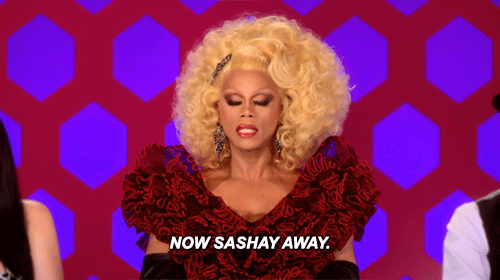Is RuPaul’s Drag Race’s Popularity Leading To Appropriation Of Gay Culture?
It started out as a bizarre, niche competition show, but these days we’ve all heard of RuPaul’s Drag Race. Shangela’s quoted on the daily. I’ve witnessed half drunken squabbles in night club queues, concerning Eureka vs. The Vixen. Slang amongst the drag queens is now common lingo among millennials, giving alternative meanings to phrases like ‘shade’ and ‘reading’. What was once such an out there show, now has a defined place in pop culture.
And that’s a good thing in many ways. More views means more popularity. More popularity gives more support towards drag. The drag community is becoming more normalised as recognition and celebration grows. Records were broken for season nine’s premiere, with Lady Gaga’s appearance bringing in 987,000 viewers. Season 10 had the show’s most watched finale yet. Guest judges are getting bigger. Finales are getting ballsier. And the more drama, the more eyes on the screen.
I wouldn’t say there’s anything wrong with Drag Race expanding its audience. This show is entertaining, but it’s also eye-opening and inspiring. Competitors transform effortlessly from spitting sassy comebacks during ‘Untucked’ footage, to supporting each other’s battles through serious issues, from cancer to eating disorders, bullying to mass shootings.
And you know what? These queens are so fucking talented. Give these people the audience they deserve because everyone should know how incredible they are. For all those claiming it’s just a bunch of blokes prancing around in a dress: I’d like to see you try. I’ll give you the challenge of making an entire outfit from scratch, entirely out of hair, that has to impress the bulletproof judge, Michelle Visage. Give the fan favourite episode ‘Snatch Game’ a go, and we’ll see if you don’t end up lip synching for your life. Designing, acting, choreographing, thinking on their feet, dealing with criticism – they’ve got to own it all. And don’t get me started on those death drops.
But actually, this does highlight a problem. While these girls are so good at what they do – and work so hard for it – it makes me sad to see them reduced to a wig and some cute makeup, too often in today’s culture. I’ve seen armies of drunken girls, who would describe themselves as fans of the show, pet drag queens like a dog in a funny outfit.
Most of us have become aware of how annoying it is when some ignorant white girl digs her hands into a woman of colour’s natural hair, invading their personal space with a smile on their face. They have good intentions, as they scurry excitedly over, blurting, “OhmygodIloveyourhair! I wish I had hair like this.” But it’s still bloody irritating. I’ve heard the exact same thing said to a drag queen in a gay bar, surrounded by a rowdy hen party, and yet everyone acts as if they were on their best behaviour.
As Drag Race has gained popularity, even in mainstream media, many people simply see the show as the latest trend. It’s fashionable to watch Drag Race. You’ll look stupid if you don’t understand that meme because you don’t know who the hell Miss Vanjie is?! But it’s so much more than that.
Drag is a community that has accepted many people who weren’t confident accepting themselves. Many contestants have overcome homophobia, and similar obstacles, and drag has offered them a space to be themselves without any judgement. Drag is a territory they are proud of because it’s given them their freedom.
But hold on: I, like a lot of RuPaul fans, am not a drag queen. And I would bet a lot of money on the fact that I’ll never be one. So, who the hell am I to speak for them? What do I know? Well, from the perspective of somebody the show wasn’t originally made for, I want to talk to people in a similar position, who have joined the RuPaul bandwagon. I believe it’s okay for people from all walks of life to watch and enjoy drag. But I think you also need to remember that this is not your culture. Embrace it, share it, and educate yourself about it, but respect the fact that drag is more than some false lashes and striking contour.
But then, if we’re talking about gay culture, it’s not as simple as having some set-in-stone criteria. Plenty of gay people – in fact, plenty of drag queens – don’t meet the stereotypes of Drag Race. So, while Drag Race may be helping to appropriate gay culture, perhaps gay culture and mainstream culture are always going to overlap because, funnily enough, gay people are people.
Winner of season six, Bianca Del Rio, has been pretty vocal about this, saying “There’s not a gate around all the gay people in a community. That’s so silly! What’s ‘gay culture’? What’s exclusive?! The world is not full of that many gay people and a lot of gay people don’t like Drag Race!” She’s got a point. Should we get caught up with boundaries when drag is all about inclusion?
I think there is an element of appropriation at play here, and that needs to be acknowledged. Elements of drag race are appearing everywhere – in our language, in our fashion, in other TV shows such as the USA’s Lip Sync Battle, which RuPaul described as a 'poor rip-off' of Drag Race. But once people realise that drag is more than a trend to rub off on you, there’s more respect for this artform. It’s not a craze, waiting to blow over – drag is a sustainable lifestyle for many people. It’s about those expected to be masculine and insensitive celebrating their femininity, as a middle finger to society. As said by RuPaul himself, “what you’re witnessing with drag is the most mainstream it will get. But it will never be mainstream, because it is completely opposed to fitting in.”








